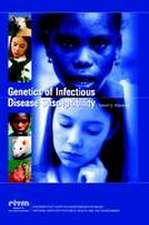Epidemiological and Molecular Aspects on Cholera: Infectious Disease
Editat de T. Ramamurthy, S.K. Bhattacharyaen Limba Engleză Paperback – 3 dec 2012
| Toate formatele și edițiile | Preț | Express |
|---|---|---|
| Paperback (1) | 1414.80 lei 6-8 săpt. | |
| Springer – 3 dec 2012 | 1414.80 lei 6-8 săpt. | |
| Hardback (1) | 1428.54 lei 6-8 săpt. | |
| Springer – 21 oct 2010 | 1428.54 lei 6-8 săpt. |
Din seria Infectious Disease
- 5%
 Preț: 1435.28 lei
Preț: 1435.28 lei - 5%
 Preț: 1430.35 lei
Preț: 1430.35 lei - 18%
 Preț: 723.51 lei
Preț: 723.51 lei - 5%
 Preț: 801.13 lei
Preț: 801.13 lei - 5%
 Preț: 683.00 lei
Preț: 683.00 lei - 5%
 Preț: 1110.72 lei
Preț: 1110.72 lei - 5%
 Preț: 1094.25 lei
Preț: 1094.25 lei - 5%
 Preț: 1101.37 lei
Preț: 1101.37 lei - 5%
 Preț: 790.88 lei
Preț: 790.88 lei - 5%
 Preț: 1027.12 lei
Preț: 1027.12 lei - 5%
 Preț: 1364.19 lei
Preț: 1364.19 lei - 18%
 Preț: 1280.72 lei
Preț: 1280.72 lei - 5%
 Preț: 2038.58 lei
Preț: 2038.58 lei - 18%
 Preț: 944.99 lei
Preț: 944.99 lei - 5%
 Preț: 1414.29 lei
Preț: 1414.29 lei - 5%
 Preț: 1113.99 lei
Preț: 1113.99 lei - 5%
 Preț: 1431.81 lei
Preț: 1431.81 lei - 5%
 Preț: 1121.69 lei
Preț: 1121.69 lei - 5%
 Preț: 1117.65 lei
Preț: 1117.65 lei - 5%
 Preț: 1612.30 lei
Preț: 1612.30 lei - 5%
 Preț: 723.05 lei
Preț: 723.05 lei - 18%
 Preț: 1253.42 lei
Preț: 1253.42 lei - 5%
 Preț: 1321.68 lei
Preț: 1321.68 lei - 5%
 Preț: 1427.62 lei
Preț: 1427.62 lei - 5%
 Preț: 725.03 lei
Preț: 725.03 lei - 5%
 Preț: 712.60 lei
Preț: 712.60 lei
Preț: 1414.80 lei
Preț vechi: 1489.27 lei
-5% Nou
Puncte Express: 2122
Preț estimativ în valută:
270.71€ • 283.41$ • 224.00£
270.71€ • 283.41$ • 224.00£
Carte tipărită la comandă
Livrare economică 05-19 aprilie
Preluare comenzi: 021 569.72.76
Specificații
ISBN-13: 9781461427049
ISBN-10: 1461427045
Pagini: 384
Ilustrații: XII, 372 p.
Dimensiuni: 155 x 235 x 20 mm
Greutate: 0.54 kg
Ediția:2011
Editura: Springer
Colecția Springer
Seria Infectious Disease
Locul publicării:New York, NY, United States
ISBN-10: 1461427045
Pagini: 384
Ilustrații: XII, 372 p.
Dimensiuni: 155 x 235 x 20 mm
Greutate: 0.54 kg
Ediția:2011
Editura: Springer
Colecția Springer
Seria Infectious Disease
Locul publicării:New York, NY, United States
Public țintă
Professional/practitionerRecenzii
From the reviews:
“This book covers current epidemiological and molecular aspects of cholera. … this book will be of value for researchers wishing up-to-date information on cholera. It is very obvious the book is most appropriate for researchers in cholera and other enteric diseases. … The authors are recognized authorities in cholera research.” (Carlos E. Figueroa Castro, Doody’s Review Service, January, 2010)
“This book covers current epidemiological and molecular aspects of cholera. … this book will be of value for researchers wishing up-to-date information on cholera. It is very obvious the book is most appropriate for researchers in cholera and other enteric diseases. … The authors are recognized authorities in cholera research.” (Carlos E. Figueroa Castro, Doody’s Review Service, January, 2010)
Textul de pe ultima copertă
Though cholera is an ancient disease, its perennial occurrence in several parts of the world has attracted many researches to find ways and means to combat the disease. The prevailing seventh pandemic cholera is dominating since 1961, but the dimension of the disease has taken several silhouettes, as the genetic structure and functions of the Vibrio cholerae has changed to a great extent. Several recent studies have shown that transformation of the pathogen at the molecular level has ameliorated several cholera outbreaks and epidemics of with successive new clones of V. cholerae.This comprehensive compilation, written by eminent international researchers reviews the epidemiology of cholera in Africa, Asia, Russia and Latin Americas. The other chapters contributed by acclaimed authors cover various aspects on evolution, polysaccaharide biosynthesis, SXT element, integrons, small molecule signalling systems, flagellar synthesis, filamentous phages, pathogenic role of proteases and hemolysin, and other putative virulence factors. In addition, ecology of V. cholerae and management of cholera were also discussed in detail.This book will be good source of information to all researchers with interests in infectious diseases, microbiology and molecular biology.
Caracteristici
This book describes updated management components of cholera. Effective analysis and integration of this information leads to predictive models on functional aspects of V. cholerae. New directions are available to overcome the emerging and reemerging infectious diseases with the strategic application of many tools and technology. Includes supplementary material: sn.pub/extras









